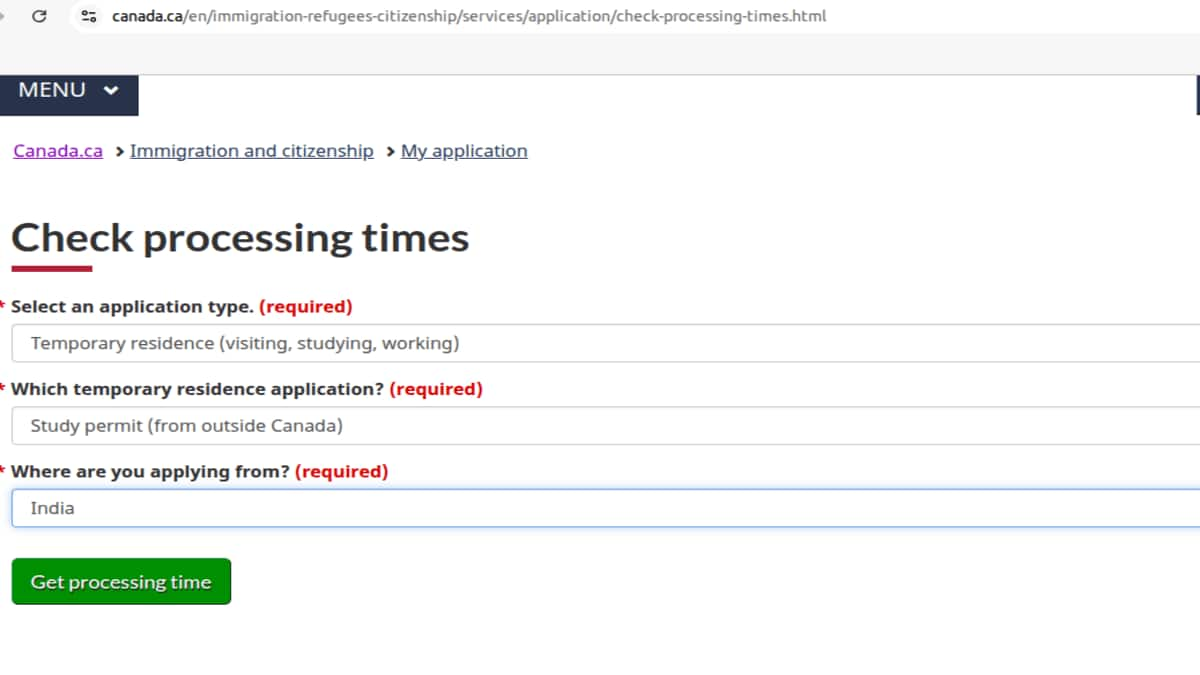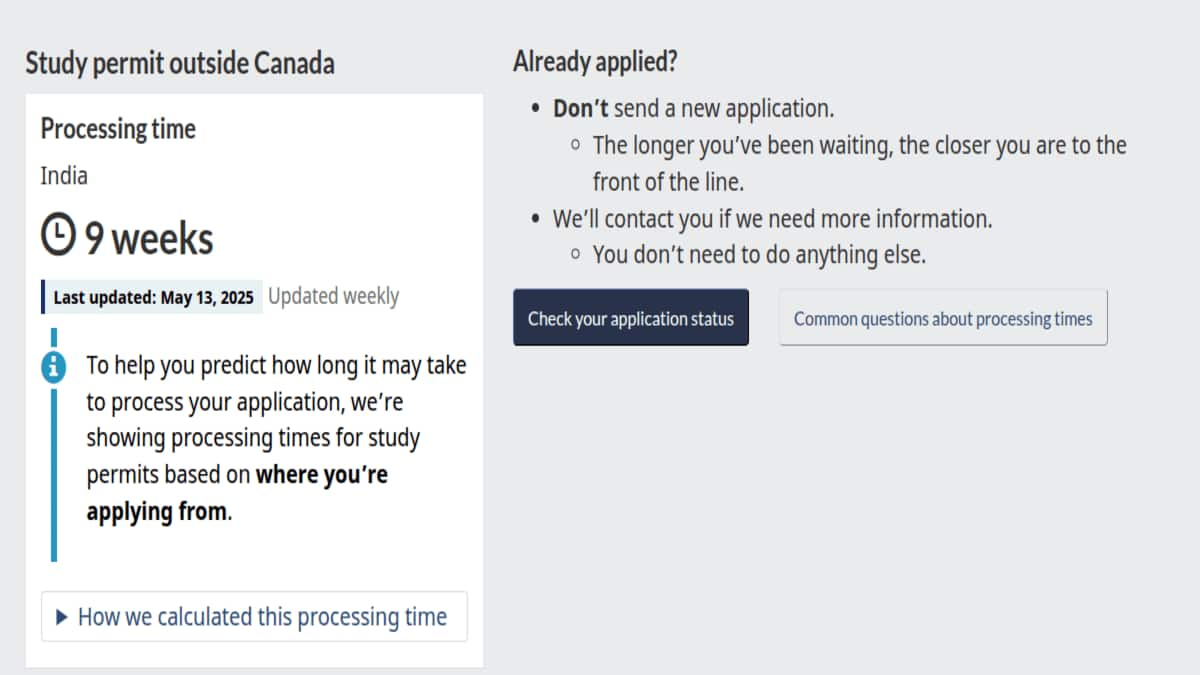Canada Student Visa Processing Time From India in 2026
Are you planning to study in Canada? Many international students, especially those from India, dream of pursuing higher studies in Canada. A Canadian student visa is the basic prerequisite to study in Canada. It is crucial to understand Canada student visa processing time while planning your study abroad journey. The exact Canada student visa processing time varies as per the application. Generally, it takes four to eight weeks for a visa application to be processed. As the Student Direct Stream (SDS) is suspended by the Canadian government, all applications must run through the general visa process. This article will give you a clear picture of the IRCC (Immigration, Refugees and Citizenship Canada) timelines, some tips to ensure faster visa approval and other Canada student visa requirements.
This Story also Contains
- Latest IRCC Study Permit Updates
- What is a Canada Student Visa?
- When Should You Apply for a Canada Student Visa?
- Documents Required to Apply for a Study Permit in Canada
- Canada Student Visa Processing Time 2026
- Country-wise Canada Student Visa Processing Times 2026
- How to Check Canada Visa Processing Time in 2026?
- Factors that Affect the Canada Study Visa Processing Time
- Tips to Reduce Canada Student Visa Processing Time
.jpg)
Read more: Best Student Cities in Canada
Latest IRCC Study Permit Updates
Canada has plans to minimise the total number of new international student visas in the country, as the target for 2025 is 437,000.
The financial requirements for students who are on study permits in Canada have increased to CAD 20,635.
Now, international students with a valid Canadian student visa are allowed to work for 24 hours per week off campus while they are on their study permit.
Also read:
What is a Canada Student Visa?
Officially known as the study permit, the Canadian student visa allows international students to become a part of Designated Learning Institutions (DLIs) in Canada. In addition to this, international students also require a TRV (Temporary Resident Visa) and eTA (Electronic Travel Authorisation) to enter the country.
Read more: List of Designated Learning Institutions (DLI Colleges) in Canada
When Should You Apply for a Canada Student Visa?
It is better to apply for a Canadian study permit as early as possible. To avoid stress and delays, it is recommended to apply for the study permit at least 3-4 months before your course start date. Here is the ideal study visa Canada timeline:
Intake | Ideal Visa Application Window |
May 2026 | January – February 2026 |
September 2026 | May – June 2026 |
January 2026 | September – October 2025 |
Related reads:
Documents Required to Apply for a Study Permit in Canada
Before you apply for a student visa Canada, make sure you have the following documents required for Canadian student visa:
Letter of acceptance from a DLI
Provincial Attestation Letter
Proof of identity
Proof of financial support
Other documents like a letter of explanation, medical exam certificate, etc
Canada Student Visa Processing Time 2026
The latest IRCC Canada student visa processing time for a study permit in Canada 2026 depends on the following:
The country from which the student is applying
Type of application (SDS or Non-SDS)
Submission of required documents
Note: With effect from November 8, 2024, the Canadian immigration authorities have discontinued the Student Direct Stream (SDS) visa programme for international students. Since then, all the visa applications have been processed under the standard Canada student visa stream.
Country-wise Canada Student Visa Processing Times 2026
Here are the study visa processing times by country, given in the table below:
Country | Processing Time |
|---|---|
India | 7–12 weeks |
China | 4 weeks |
Philippines | 5 weeks |
Nigeria | 6 weeks |
Pakistan | 12 weeks |
United States | 6 weeks |
Note: Processing times are subject to change and can vary depending on the individual circumstances and completeness of the visa application.
How to Check Canada Visa Processing Time in 2026?
With the help of IRCC’s official visa processing time tool, you can easily find out the processing time for your study visa. Here are the steps to check the current Canada student visa processing time.
Step 1: Visit the official website of the government of Canada (www.canada.ca).
Step 2: Click on ‘Visit Canada’.
Step 3: Click on ‘Check Processing Times’. You will be redirected to the window as shown below in the image.

Step 4: Fill in the required details, such as the application type, type of temporary residence application, and the applying country and click on ‘Get Processing Time’.
Step 5: Once you click on get processing time, you will get the Canada student visa processing time for your respective country as shown in the image below. For India, it is about 9 weeks. You can even check your Canada visa application status by clicking on it.

Factors that Affect the Canada Study Visa Processing Time
The Canada international student visa processing time depends on a lot of factors. A lot of variables can affect the speed of your study visa approval time. The following are some factors that can speed up the process of your Canada student visa:
Submitting complete documents
Timely biometric and medical examinations
Applying for the student visa during the off-season
On the other hand, the visa processing time gets delayed when your visa application is incomplete or incorrect, the biometric submission is not on time, and if you apply for the Canadian study permit during peak rush seasons, that is, during the months of April to July and in October.
Read more:
Tips to Reduce Canada Student Visa Processing Time
Here are some tips that can help your visa get processed faster.
Refer to the IRCC document checklist and check all the uploads before applying.
The Canada study visa processing time after biometrics is lesser if your biometrics are done without any delay. So, get the biometric appointments as soon as possible and get them done properly.
Provide strong proof of financial support
Submit a compelling SOP (Statement of Purpose)
Track your study permit application via the official IRCC portal or VFS Global.
The visa processing time after the medical exam gets faster when applicants have already done their medical examination before applying. So, don’t procrastinate and get it done before you apply for the study permit.
Understanding the Canada student visa processing time in 2026 is crucial in getting admission to the best universities in Canada. Make sure that your visa application is complete, accurate, and well-documented. To avoid delays, follow the best practices mentioned above and apply as early as possible.
Articles You May Like:
Frequently Asked Questions (FAQs)
No, Canada has suspended its popular Student Direct Stream (SDS) visa option, making the visa process difficult for international students. The Canadian government has also announced a new cap for study visas in 2026.
The Canada student visa stamping process ranges from 2-3 weeks. No matter which program you choose, this process will take 2-3 weeks.
Yes, a Guaranteed Investment Certificate is mandatory for international students applying for a Canadian student visa. It shows that you have enough funds to support yourself while studying and living in Canada.
The study permit processing time in Canada may vary, but generally, it takes around 6 weeks. However, it may also take up to three months, depending on the country you are applying from.
After you have provided your biometric information for a Canada student visa, the next step is processing your application by the IRCC.
Questions related to
On Question asked by student community
Hello,
After completing BPT in India, you must get your qualification approved by the Canadian Alliance of Physiotherapy Regulators (CAPR) .
First, apply for credential assessment , then pass the written and clinical exams . You also need an English test score (IELTS or CELPIP) .
After clearing these, apply
your career plan is valid as it provide knowledge which is relevant to become ips officer but you need to prepare for other subjects too because UPSC's ips broad syllabus includes Indian governance and current affairs too.
I advice to choose b.a in psychology in india as this avoids the
An undergraduate degree abroad is a good investment if you pursue it in canada because it provides quality education at affordable costs, along with a clearer path to post-graduation work and permanent residency,making it a reliable option to settle abroad.
Coming to U.S. it offers top-tier universities and higher salaries,
After completing a BSc in Biochemistry, you can pursue various courses in Canada such as MSc in Biochemistry, Biotechnology, Molecular Biology, Pharmacology, or Clinical Research. These programs offer advanced knowledge and open opportunities in research, healthcare, and industry.
Hello,
Yes, you can pursue MD in Radiology in Canada after completing a B.Sc. in Radiology, but you need to complete a recognized medical degree (like MBBS) first. After that, you must pass the Medical Council of Canada Qualifying Examination (MCCQE) and complete a residency in radiology. Alternatively, you can
Applications for Admissions are open.
Want to study in Ireland? Explore Universities & Courses
Study in Canada
ApplyExplore Universities, Courses & Subjects | Work while study
Study in UK
ApplyApply for upcoming intake & plan your journey
Study in USA
ApplyUniversities inviting applications | Get expert guidance
Study in Australia
ApplyShortlist best ranked universities & get expert guidance